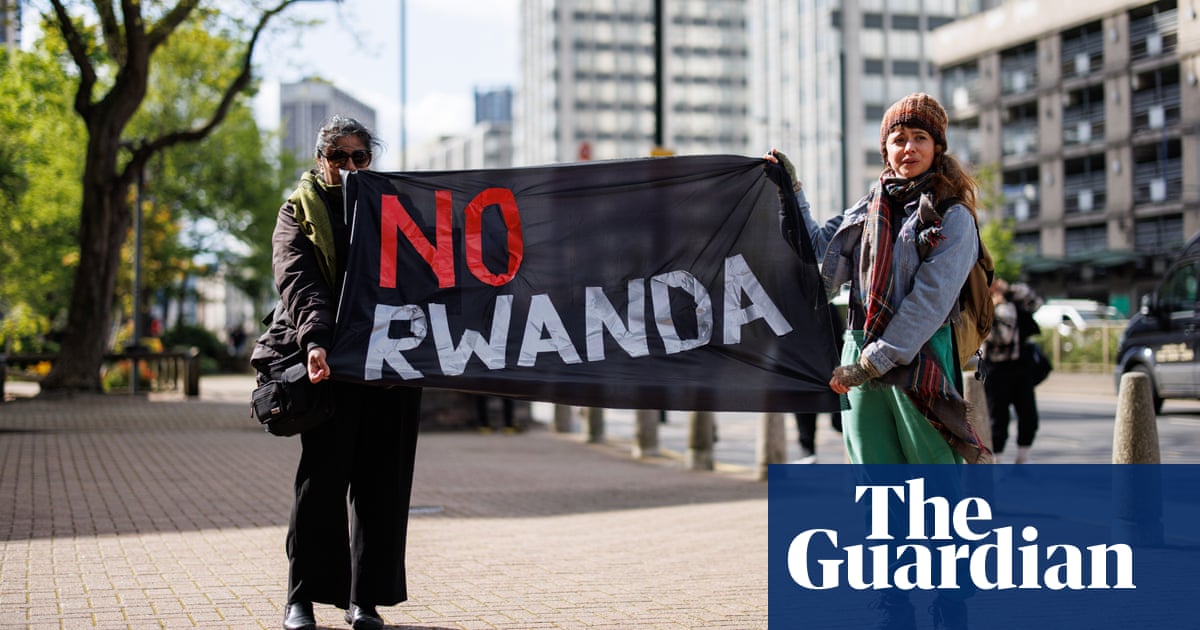
The Home Office is dealing with growing fallout from the high-profile roundups of asylum seekers it wants to send to Rwanda, as some have gone into hiding while others have fled across the border to Ireland.
Officials began rounding up asylum seekers to detain them for the Rwanda scheme a week ago, with at least one now on hunger strike and another threatening suicide.
While the government has disseminated its message widely about detaining people for Rwanda, it is not clear whether officials had anticipated that some asylum seekers would go into hiding and others would go to Ireland.
Lou Calvey, the director of the charity Asylum Matters, said: “Frontline asylum charities report people leaving their asylum accommodation in order to avoid arrest. They are raising the alarm about the increasing risks of destitution and exploitation.”
Asylum seekers who have attended regular reporting sessions at centres around the UK have said that they had never seen things so quiet.
“I walked right in and didn’t have to queue at all. In all the years I’ve been reporting I’ve never seen it so deserted,” said one man from Belarus who has been in the UK for more than a decade but is fearful the Home Office could arrest him even though he is not in scope for the first cohort of returns – those who arrived between January 2022 and June 2023.
Another asylum seeker who has received a notice of intent for Rwanda but has not so far been detained said he had received several calls from friends in his community urging him to go into hiding.
A Syrian refugee said he was urging asylum seeker friends at risk of being sent to Rwanda to hide.
“I was an asylum seeker in 2020 when the Home Office was trying to deport as many asylum seekers as possible to European countries they had passed through before Brexit started. Some asylum seekers went into hiding then and I can see that it is happening again because of Rwanda.”
The first week of roundups of asylum seekers for Rwanda has not acted as the deterrent the government hoped for small boat crossings, with 1,420 people crossing in the last seven days up to Sunday. The figure includes the highest daily total so far this year with 711 crossing last Wednesday.
Meanwhile, in Ireland, just days after the authorities removed a tent city of asylum seekers in the heart of Dublin outside the International Protection Accommodation Services centre, the tents have returned close to where they were before.
Both sides of the city’s Grand Canal are lined by about 70 blue tarpaulin tents provided by charities for asylum seekers from countries including Nigeria and Afghanistan.
Last week the new Irish prime minister, Simon Harris, told the Dáil that “We do not want to live in a country where makeshift shantytowns are allowed to just develop.”
The authorities in Dublin are expected to provide more accommodation later this week to deal with the unprecedented numbers seeking international protection, some arriving from the UK.
Ireland’s justice minister, Helen McEntee, recently said 80% of those arrivals had crossed the border from Northern Ireland. Later in the week Dublin estimated the figure to be about 90%.
The Northern Ireland justice minister, Naomi Long, later said: “Those are figures we in Northern Ireland don’t recognise.”
At a quiet Home Office reporting centre a few days ago, one Ethiopian asylum seeker who is in scope for removal to Rwanda because of his date of arrival in the UK said he was “very worried” about being detained when he went inside the centre to report.
He said: “My feelings are not good. Everything’s not good.”
An Iranian Kurdish man who came to the UK 14 years ago said he did not understand how refugees could be sent to a country they did not come from.
“Originally I’m not coming from Rwanda. How can you send me to Rwanda? I don’t want to go to Rwanda,” he said. “Tell me how, what’s the reason?”
A Home Office spokesperson said:“The unacceptable number of people who continue to cross the Channel demonstrates exactly why we must get flights to Rwanda off the ground as soon as possible.
“Many of those in scope to be relocated are also staying in Home Office accommodation. For those that aren’t, we have robust procedures in place to prevent absconding and we remain in contact with those in scope for relocation to Rwanda through a number of means, including face-to-face and digital reporting.”












